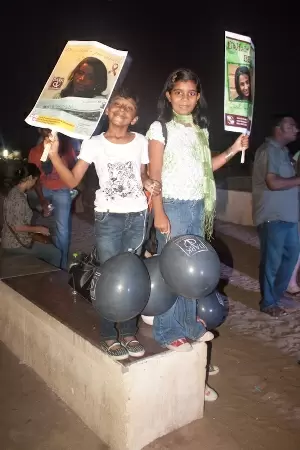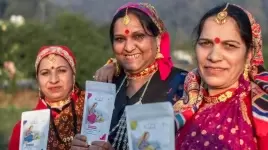Colour prejudice has deeper meanings and unwarranted consequences

26-April-2012
Vol 3 | Issue 17
Have you witnessed any of these statements or realities around you:
• Buying Double-whitening-action cream to get fair in three days?
• Not casting fair-skinned actors to play the role of a housemaid, the evil nemesis, or the outcast?
 |
|
Advertisers play on our insecurities and market products that endorse discriminatory philosophies
|
• Families looking out for a ‘fair bride’?
• Making pregnant mothers bathe in milk and saffron and eating lots of nuts so that the child is born with fair skin; and if that doesn’t work, then buying the double-whitening-action cream?
These ideologies have not changed since the days of our grandmothers. For generations now we have been saturating in the belief that dark skin is undesirable – to the point where we, consciously, start to discriminate and create divides between the fair and dark skinned people.
Even in the 21st century, when issues like poverty, hunger, and war are ravaging our lands, we have contributed to the booming half-billion-dollar skin whitening industry.
As a nation, we have swept the issue of skin colour bias under a mountain of other social issues and have convinced ourselves that it’s not important to speak against the blatant discrimination against dark skin.
We have blinded ourselves to the psychological effects it has on the psyche of our society, including the minds of our children.
We allow advertisers to play on our insecurities and market products that endorse discriminatory philosophies. It’s time we introduced new adjectives to describe dark-skin other than dirty, dusky, raunchy, or ugly.
In response to the prevailing bias, Women of Worth launched the Dark is Beautiful campaign in 2009 and challenged the iniquitous belief that the value and beauty of an Indian woman is determined by the fairness of her skin.
It aims to replace the dogma that corrodes the self-worth of countless girls and women with the message that beauty is beyond colour. While it would appear that skin colour is an issue that primarily affects women, the campaign has drawn a strong response from men too.
 |
|
A ‘Dark is Beautiful’ campaign van in Chennai
|
As the Executive Director of WOW, Kavita Emmanuel says, “We all need to celebrate who we are - the way God made us! Dark, yellow, brown, or white. But there are confusing messages around us compelling us to fit a certain mold to be considered beautiful. Let’s teach our children and youth to filter such messages that our being constantly thrown at us.”
Actress Anu Hasan spokesperson for the campaign since March 2012 says, “People are focusing on the wrong things. Indian society gives you the impression that fair is beautiful. It is wrong to discriminate against skin color; you lose out on appreciating what is real and what is truly beautiful.”
In a culture where we me make several lists and checklists to help us function effectively, here’s a list with just six simple suggestions to beat the bias:
• Don’t compare siblings who are of different skin tones
• Teach children to include friends of many different colours
• Don’t let skin colour stop you from pursuing your dreams
• Learn to see beauty in all skin tones
• Don’t believe the false notion that you are not beautiful because of your skin colour
• When it comes to marriage don’t choose partners simply based on their skin colour
“Our message to our children,” says Kavita, “is that every complexion is equally beautiful. Appreciate who you are, and celebrate the way you are made.”
Lydia Durairaj is an activist with the 'Dark is Beautiful' campaign that seeks to draw attention to the unjust effects of skin colour bias and also celebrates the beauty and diversity of all skin tones
Also Read
Afreen, Falak and fair vaginas – the state of Indian women














